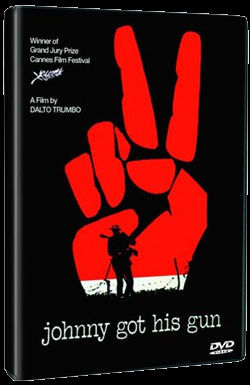Dom Robinson reviews
Arrow Film Distributors


- Cert:

- Cat.no: FCD 163
- Running time: 106 minutes
- Year: 1971
- Pressing: 2004
- Region(s): 2, PAL
- Chapters: 20
- Sound: Dolby Digital 2.0 (Mono)
- Languages: English
- Subtitles: None
- Widescreen: 1.85:1
- 16:9-Enhanced: Yes
- Macrovision: Yes
- Disc Format: DVD 9
- Price: £15.99
- Extras: None
Director:
- Dalton Trumbo
Producer:
- Bruce Campbell
Screenplay:
- Dalton Trumbo
Music:
- Jerry Fielding
Cast:
- Joe Bonham: Timothy Bottoms
Kareen: Kathy Fields
Joe’s Mother: Marsha Hunt
Joe’s Father: Jason Robards
Christ: Donald Sutherland
Fourth nurse: Diane Varsi
Orator (as Robert Cole): Dalton Trumbo
I first came across Johnny Got His Gun through Metallica’s 7-minute 1989 single inspired by this film, “One”, the longform video for this which featured clips from the film. Heart-breaking and massively thought-provoking though the video was, it took until now to get to see the film as it wasn’t the kind of war film that would crop up on TV like the others.
The words “Dulce et decorum est pro patria mori”, aka “it is sweet and right to die for your country” appear during the film, yet for Private Joe Bonham (Timothy Bottoms) an incident out on the battlefield, on the last day of the First World War, leaves him somewhere inbetween life and death. He’s lying in a hospital bed, kept out of the way of most people who might pass through, and has no arms, no legs, he cannot see, talk or hear. Yet, despite all that, the horror for him is that he’s still 100% conscious.
Timothy Bottoms, here in his debut movie role, may be the main actor of the piece, but just because of his injuries, it doesn’t mean he only spends his time completely covered up with blankets and bandages, as it jumps back non-chronologically at past times in his life, such as the girl he knew before going to war. All the scenes in the current time are in black-and-white, while all flashbacks and dreams are in colour. You’ll soon find that, like Joe, it’ll take you some time to wonder what’s a dream and what’s a flashback, or is it all a dream? Those who have seen 1990’s Jacob’s Ladder will feel in familiar territory.
It’s difficult to say more about this film, but I can say without giving anything away, that the issue is dealt with great sensitivity.
It’s also incredible how Timothy Bottoms narrates his thoughts, done as a voiceover but it comes across perfectly as the way its presented with the thoughts emitting into the room where he lies, yet no-one can hear him but us. And as he realises his plight, and tries to figure a way out of it, this cuts right through you. Out-bloody-standing.
There are two standout quotes from this film. One being that from Jason Robards, as shown above this review, and another from one of the many men who see Joe in hospital to assess his position: “This young man will be as unfeeling, as unthinking as the dead… until the day he joins them.”, except that we know he’s wrong. How Joe can ever get that across to them is another matter.
It’s just a shame that for prolific writer Dalton Trumbo, known for his screenplays for Papillion and Spartacus, this was the only film for which he also became the director. Five years later, he died of a heart attack.
Knowing that it was filmed in 1.66:1 and zoomed in slightly to 1.85:1, you can see this in evidence on some scenes that look a little too zoomed-in as if the director had gone all ‘Tony Scott’ and zoomed in for the sake of it. Perhaps Arrow could’ve released it instead as a 1.66:1 ratio within a 16:9 anamorphic frame? This has been done before on other films and worked perfectly well.
The picture occasionally goes out of sync, but not too much and it doesn’t happen too often. There is also some blocking on dark scenes, of which there are quite a few but, again, this doesn’t happen a great deal.
The sound was made in mono and is presented as such here, but then it’s not the kind of film that would suit a Dolby Digital 5.1 remix given the subject matter, and all the dialogue comes across perfectly apart from at least one scene where it appears to be intentional as Joe is saying goodbye to Kareen before he goes to war.
Subtitles are noticeable by their absence, there are 20 chapters and the menu features some military war drumming against the film’s logo but the menu is static and there are absolutely no extras whatsoever which is disappointing. It could be that no interviews were made at the time, in 1971, and some of the key cast/crew members have now passed on since. Would’ve been nice if some effort had been seen to have been made.
PICTURE QUALITY
SOUND QUALITY
EXTRAS











0 OVERALL



Reviewer of movies, videogames and music since 1994. Aortic valve operation survivor from the same year. Running DVDfever.co.uk since 2000. Nobel Peace Prize winner 2021.
